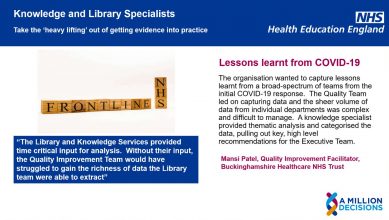Key aspects of the role
- Leading the development, delivery and evaluation of a Knowledge Management Strategy on behalf of an organisation
- Developing and maintaining knowledge management policies and protocols, systems and processes to ensure robust evidence underpins all decision-making
- Developing and embedding a knowledge management culture; building capability through partnership working and providing opportunities to ensure staff use knowledge effectively and efficiently
- Identifying and commissioning knowledge products (e.g. databases, electronic journals, knowledge sharing tools) to support the use and dissemination of organisational knowledge and innovation
- Developing effective use of the published literature and encourage knowledge sharing by providing horizon scanning services, reports and digests that summarise and synthesize the best available evidence in response to business needs.
- Ensure the production, curation and promotion of knowledge assets.
- Providing knowledge management support for evaluation of the benefits and impacts of organisational work programmes

Skills and knowledge
You may require a high level of knowledge and skills in the following CILIP Professional Knowledge and Skills Base (PKSB) sections to work within this role:
Ethics and Values. Underpinning healthcare ethics and values by providing the best available evidence at the right time, in the right place, to inform decision-making and enable better outcomes for patients and populations.
Professional development. Reflecting on practice and being self-aware about performance.
Organistional and environmental context. Understanding organisational priorities and challenges identified by the executive team.
Wider library, data, information and knowledge sector context. Networking across the healthcare economy, both information providers, data analysts and health informaticists, to support shared learning and joint working.
Data Management. Identifying and harnessing data’s value in strategic planning and business decisions, using an evidence-based approach to health knowledge service development and policy.
Information exploitation and use. Delivery of information through routes such as alerts, current awareness, enquiries and literature searches, including saving the time of users by providing time-saving services such as synthesis and summaries of evidence.
Information governance and compliance. Tracking and safeguarding of personal information including information audits of the service and the use of information asset registers.
Information management. Advising the organisation on the opportunity to improve information management.
Knowledge management. Embedding KM into ways of working – for example facilitating a Before Action Review before an organisational project commences and an After Action Review at its conclusion.
Literacies and learning. Initiating and contributing to work intended to improve the information, data, digital and health literacy of staff and learners.
Records management and archiving. Appreciation of record management issues arising within the NHS including sensitive data, appropriate disposal of records and systems for ensuring the secure access and use of records.
Research. Disseminating research evidence to inform service and quality improvement and innovation.
Customer focus. Service design and marketing. Engaging with a variety of users across the healthcare landscape to provide a professional and efficient service.
Leadership, advocacy, influencing and personal effectiveness. Showing strong leadership skills in order to ensure the visibility and breadth of involvement of the service across the organisation.
Strategy, planning and management. Considering the context of the organisation served and delivering services to benefit the organisation, users or a specific community of users.
Technology and communication. Networking and advocacy within and outside the local organisation to share good practice, maintain professional awareness, and promote services.
Further information about the CILIP Professional Knowledge and Skills Base